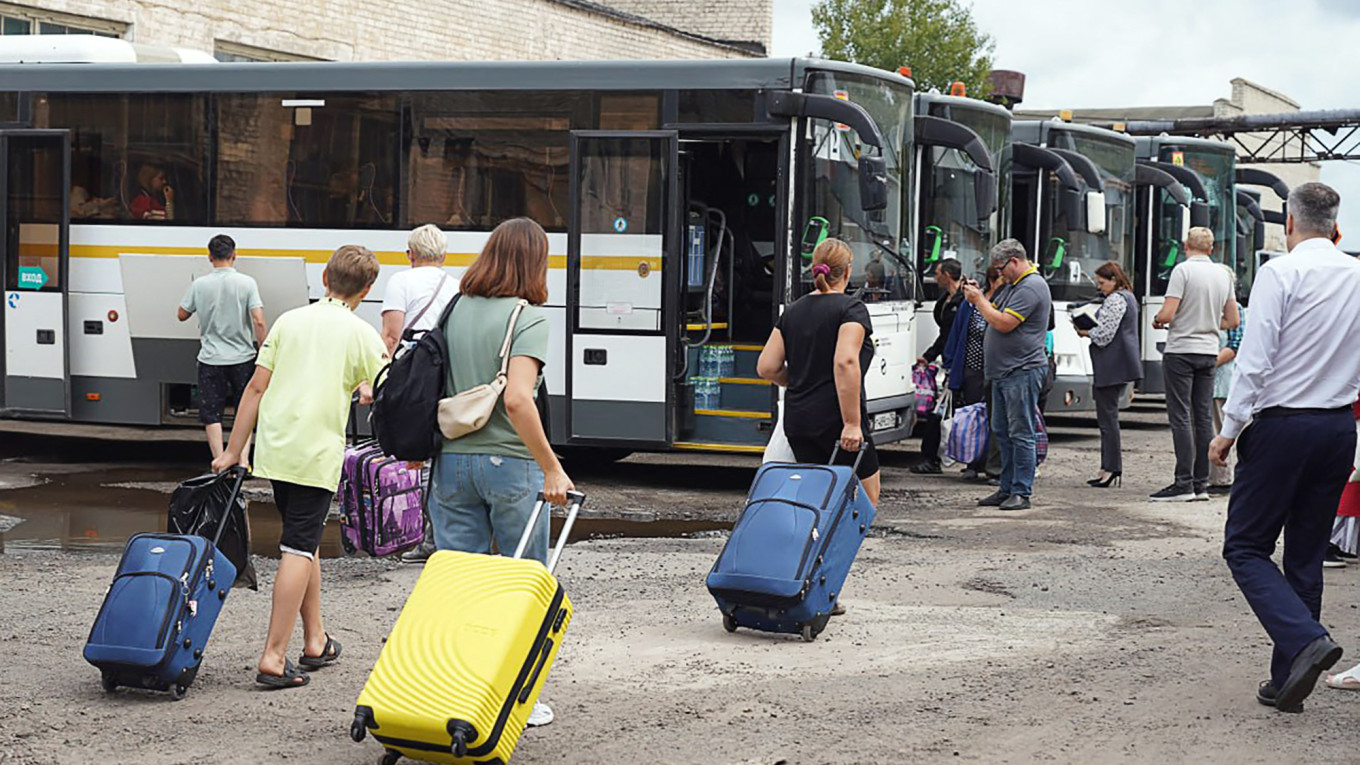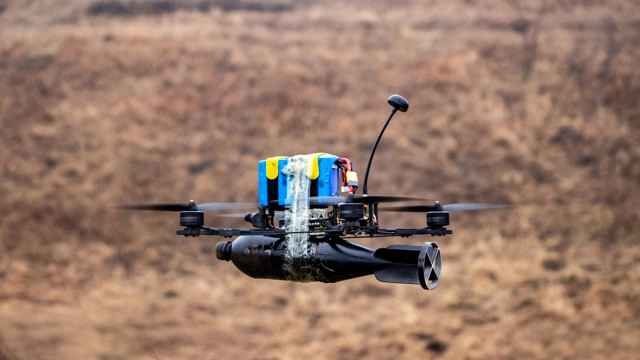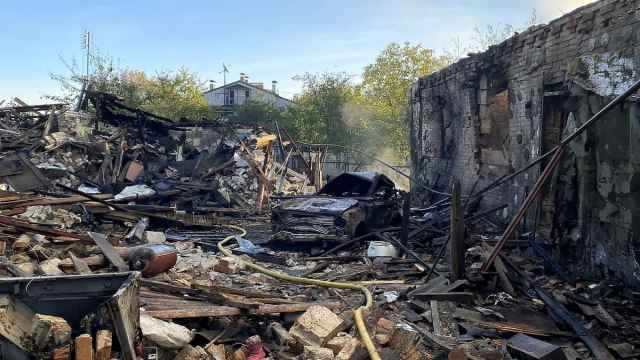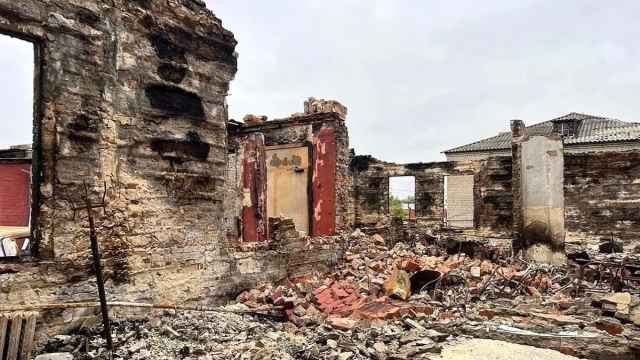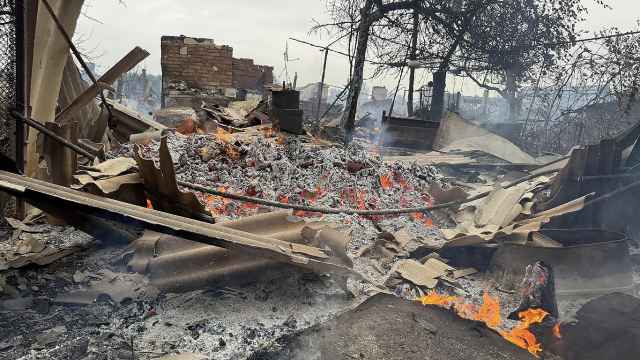Struggling to put down a major Ukrainian incursion for a fifth day, Russia on Saturday said it had evacuated tens of thousands of people from its border region, launched a "counter-terror operation" and warned that the fighting was endangering a nuclear power plant.
Ukrainian units stormed into Russia's western Kursk region on Tuesday morning in a shock attack, the largest and most successful cross-border offensive by Kyiv of the two-and-a-half-year conflict.
Its troops have advanced several kilometers and Russia's army has rushed in reserves and extra equipment — though neither side has given precise details on the forces they have committed.
Kyiv has maintained a strict operational silence on the offensive and is yet publicly to confirm it is even behind the attack.
Russia's nuclear agency on Saturday warned of a "direct threat" to the nearby Kursk nuclear power station, and local officials detailed the scale of civilian evacuations from towns and villages close to the combat zone.
"More than 76,000 people have been temporarily relocated to safe places," the state-run TASS news agency quoted an official from the regional emergency situations ministry as saying at a press briefing on Saturday.
Emergency aid has been ferried into the border area and extra trains to the capital Moscow have been put on for people fleeing the fighting.
"The war has come to us," one woman told AFP after arriving at a Moscow train station on Friday, declining to give her name.
Russia's army on Saturday confirmed it was still fighting the Ukrainian incursion for a fifth day.
It said Kyiv initially crossed the border with around 1,000 troops, around 20 armored vehicles and 11 tanks, though it claimed on Saturday to have destroyed five times that much military hardware so far.
Mass evacuations
Kyiv has maintained a strict operational silence on the offensive and for several days Ukrainian President Volodymyr Zelensky made only oblique references to the fighting there.
But in Saturday's evening address, Zelensky referred to army chief Oleksandr Syrsky's briefings "on the frontline and our actions and pushing the war into the aggressor's territory".
Thanking the soldiers involved, he added: "Ukraine is proving that it can really bring justice and guarantees exactly the kind of pressure that is needed – pressure on the aggressor."
Russia's army on Saturday confirmed it was still fighting the Ukrainian incursion for a fifth day.
It said Kyiv's forces had initially crossed the border with around 1,000 troops, 20 armored vehicles and 11 tanks, though it claimed on Saturday to have destroyed five times that much military hardware so far.
'Unprecedented'
Russia's national anti-terrorism committee said late on Friday that it was starting "counter-terror operations in the Belgorod, Bryansk and Kursk regions ... in order to ensure the safety of citizens and suppress the threat of terrorist acts being carried out by the enemy's sabotage groups."
The Belgorod and Bryansk regions also border Ukraine and likewise have been hit hard by shelling and aerial attacks since Russia launched its offensive in February 2022.
Security forces and the military are given sweeping emergency powers during "counter-terror" operations.
Movement is restricted, vehicles can be seized, phone calls can be monitored, areas are declared no-go zones, checkpoints introduced, and security is beefed up at key infrastructure sites.
On the streets of Moscow on Saturday, AFP journalists found support for tough measures to quell the response, along with pockets of anger at how the incursion was allowed to happen.
"We have to take all the steps that are possible in such a situation," said Alexander Ilyin, a 42-year-old architect.
The anti-terrorism committee said Ukraine had mounted an "unprecedented attempt to destabilize the situation in a number of regions of our country."
Russia on Friday appeared to hit back, launching a missile strike on a supermarket in the east Ukrainian town of Kostyantynivka that killed at least 14 people. Three were killed in the northeastern Kharkiv region on Saturday, local officials said.
Ukraine also said it needed to evacuate 20,000 people from the Sumy region, just across the border from Kursk.
Neither side has provided precise details on the extent of the Ukrainian incursion.
Russia's defense ministry on Saturday said it had hit some Ukrainian positions as far as 10 kilometers from the border.
It also reported hitting Ukrainian troops in areas 30 kilometers apart — an indication as to the breadth, as well as depth of Ukraine's advance.
The U.S.-based Institute for the Study of War on Saturday said it believed Ukrainian forces had pierced around 13 kilometers into Russian territory.
Belarus, Russia's close ally, on Saturday ordered military reinforcements — ground troops, air units, air defense and rocket systems — to be deployed closer to its border with Ukraine in response to Kyiv's incursion, the defense ministry in Minsk said.
'Particularly effective'
Moscow also warned of the threat to the Kursk nuclear power plant, under 50 kilometers from the fighting, a day after the head of the International Atomic Energy Agency called for "maximum restraint."
"The actions of the Ukrainian army pose a direct threat" to the Kursk plant in western Russia, state news agencies cited its atomic energy agency Rosatom as saying.
Ukraine's leaders have remained tight-lipped on the operation.
The United States, Kyiv's closest ally, said it was not informed of the plans in advance.
But President Volodymyr Zelensky has appeared to tout his troops' early successes in several cryptic remarks that do not explicitly mention the Kursk offensive.
Elsewhere on the frontline, Ukraine on Saturday reported the lowest number of "combat engagements" on its territory since June 10.
That could be a possible sign its incursion is helping to relieve pressure on other parts of the sprawling frontline where Moscow's troops had been advancing.
A Message from The Moscow Times:
Dear readers,
We are facing unprecedented challenges. Russia's Prosecutor General's Office has designated The Moscow Times as an "undesirable" organization, criminalizing our work and putting our staff at risk of prosecution. This follows our earlier unjust labeling as a "foreign agent."
These actions are direct attempts to silence independent journalism in Russia. The authorities claim our work "discredits the decisions of the Russian leadership." We see things differently: we strive to provide accurate, unbiased reporting on Russia.
We, the journalists of The Moscow Times, refuse to be silenced. But to continue our work, we need your help.
Your support, no matter how small, makes a world of difference. If you can, please support us monthly starting from just $2. It's quick to set up, and every contribution makes a significant impact.
By supporting The Moscow Times, you're defending open, independent journalism in the face of repression. Thank you for standing with us.
Remind me later.


